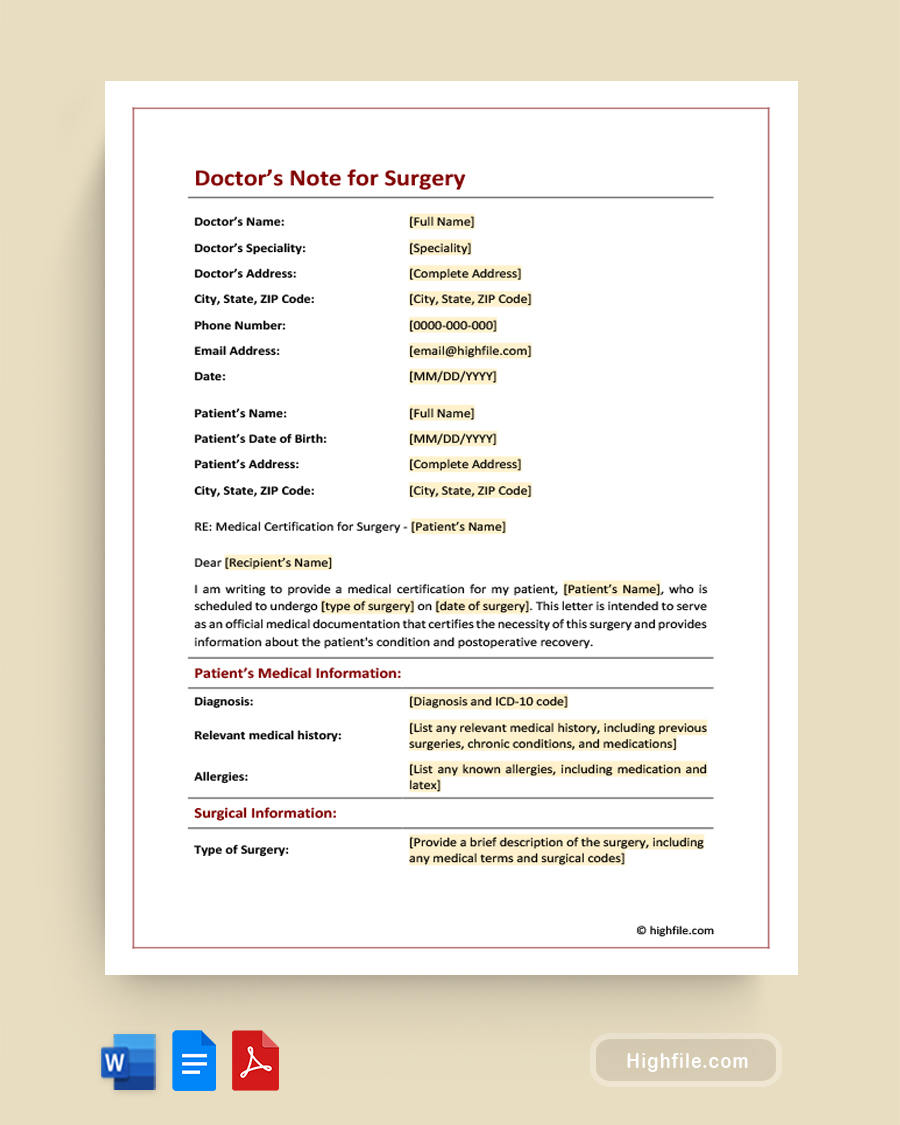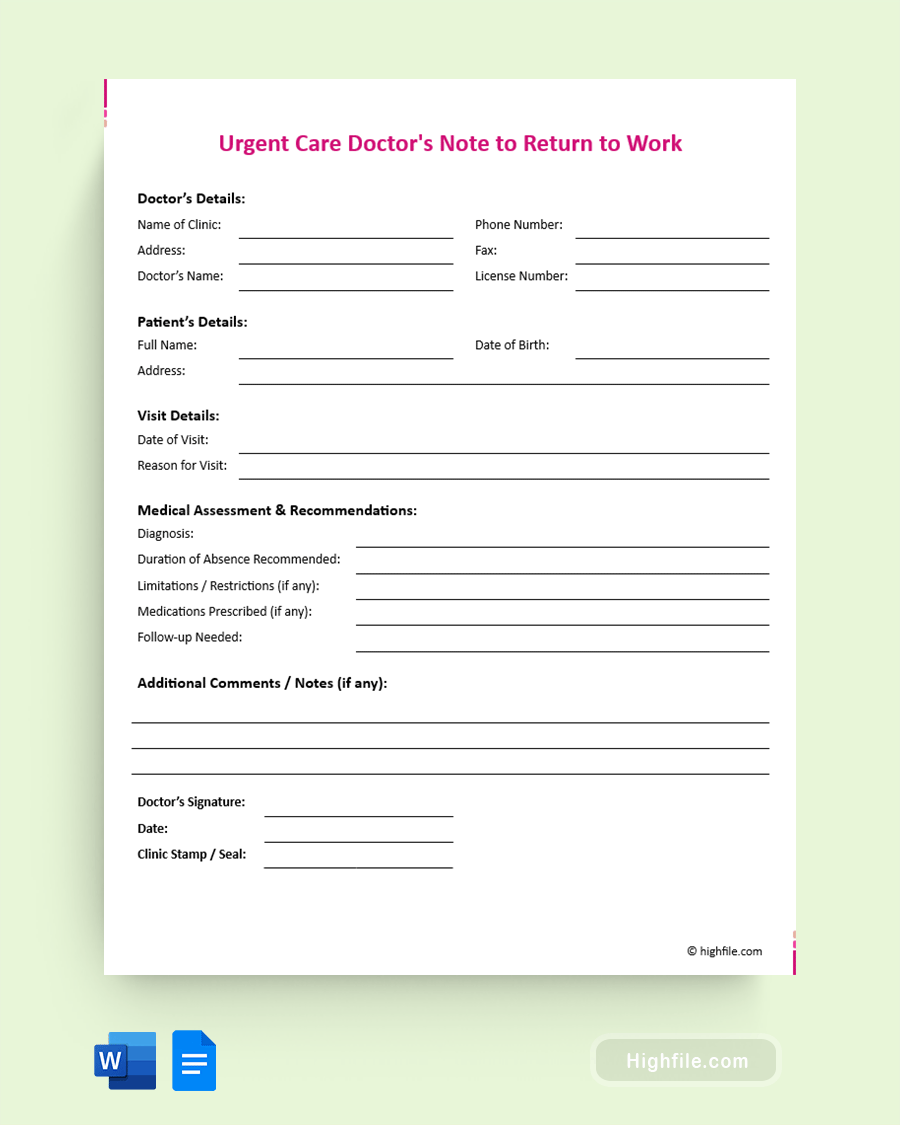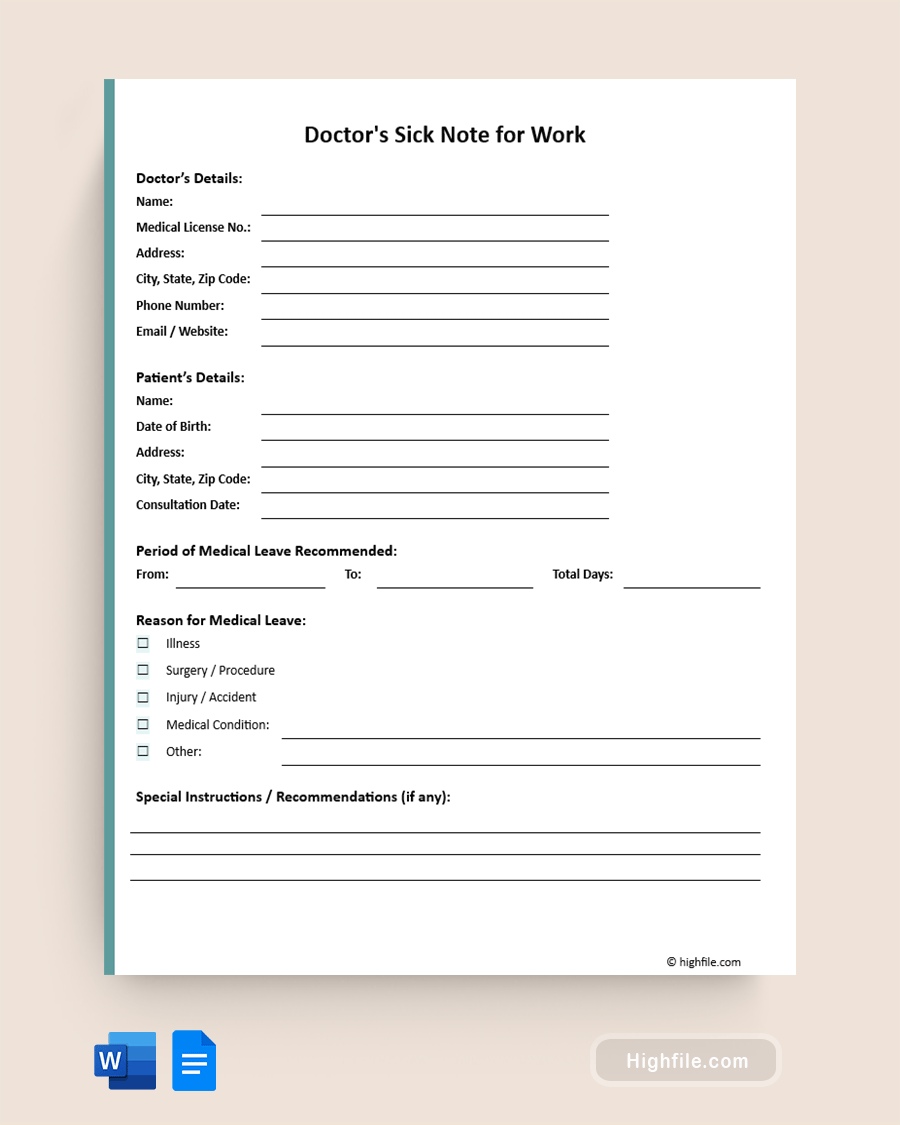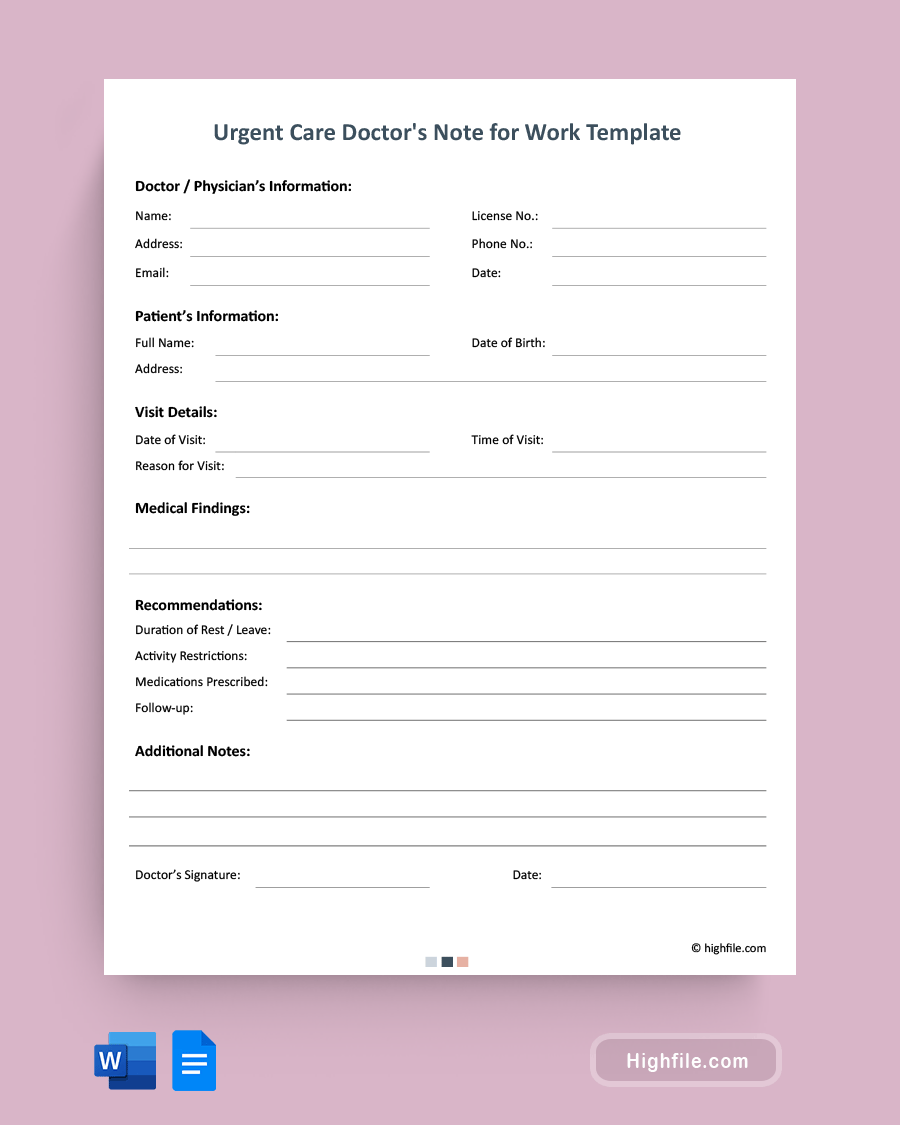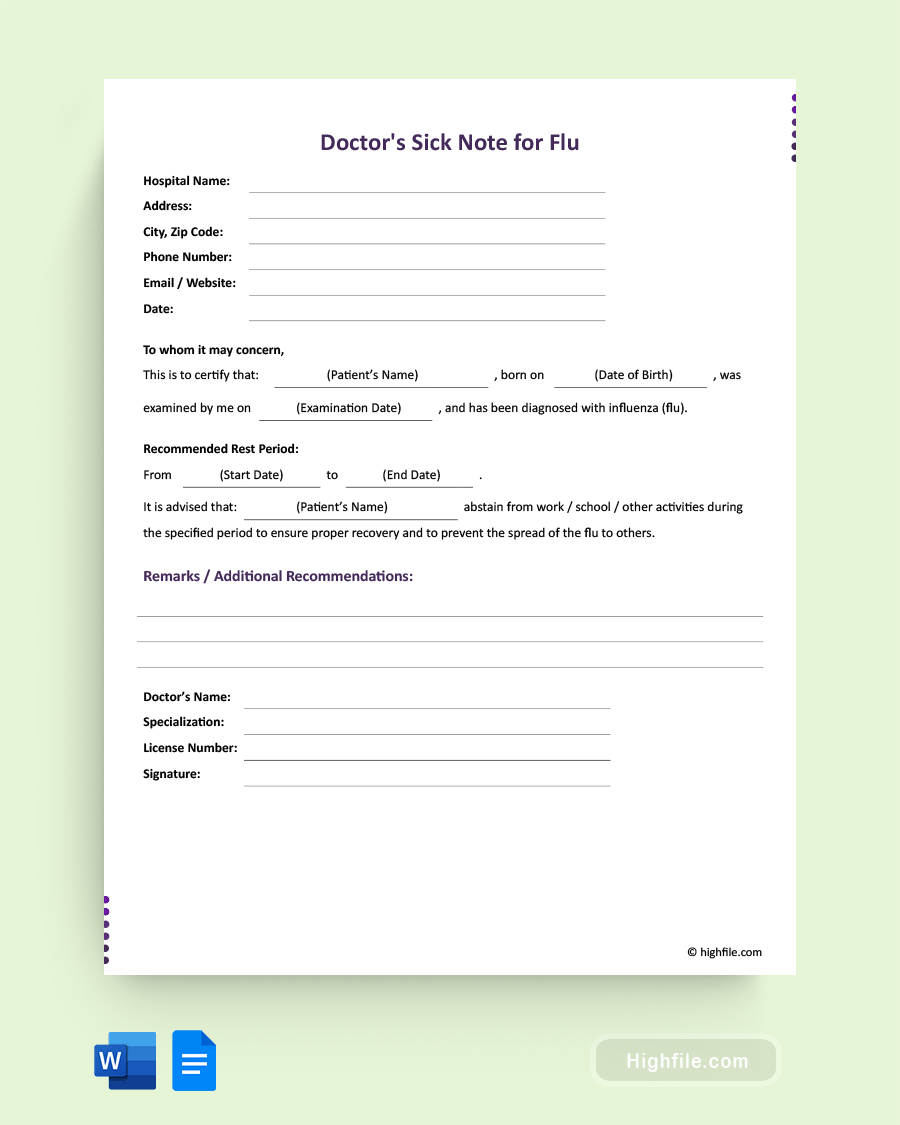A doctor’s note for surgery can benefit patients and employers in several ways. For patients, it provides documentation of the need for surgery, which an employer or school may require to support a request for time off or accommodation. It also helps the patient understand the recommended treatment plan, including pre-operative or postoperative instructions or restrictions. This can reduce confusion and anxiety and help the patient feel prepared for the procedure. For employers, the note can provide assurance that the employee has a legitimate medical reason for the time off and help them plan for any necessary staffing adjustments. It can also help protect the employer from liability issues related to the employee’s health. Using a template to compose a doctor’s note for surgery can help ensure that all the necessary information is included and that the notice is clear and professional.
What Is a Doctors Note For Surgery?
A doctor’s note for surgery is a medical document that verifies a patient’s need for surgical intervention and outlines the recommended treatment plan. The note is typically written by a surgeon or other qualified medical professional who has examined the patient, diagnosed their condition, and determined that surgery is the most appropriate course of action. The note may include details about the type of surgery, the expected outcome, and any special instructions or restrictions for the patient before or after the procedure. An employer or school may require the note to support a request for time off or an accommodation due to the surgery.
Why Is Doctors Note for Surgery Important?
A doctor’s note for surgery is an essential document that has several important benefits for patients and employers, including:
- Provides official documentation of the need for surgery
- Helps patients understand the recommended treatment plan
- Reduces confusion and anxiety related to the surgical procedure
- Assures employers of a legitimate medical reason for time off
- Helps employers plan for necessary staffing adjustments
- Provides liability protection for employers
- Ensures all the required information is included in the note
Essential Elements of Doctors Note For Surgery
When writing a doctor’s note for surgery, it is important to include the following essential elements:
- Doctor Information: Start with the doctor’s name, specialty, contact information such as phone number or email address, and date.
- Patient Information: Include the patient’s name, date of birth, and contact information.
- Subject Line: Use a concise and clear subject line to indicate the purpose of the note.
- Formal Salutation: Use a formal salutation and the recipient’s name if possible.
- Intent: Clearly state the intention, which is to provide information about the patient’s upcoming surgery.
- Medical Information: Provide information about the patient’s medical history, including any relevant diagnosis, allergies, and medications.
- Surgical Information: Include details about the type of surgery, its purpose, the name of the surgeon and anesthesiologist, and the facility where the surgery will take place.
- Postoperative Recovery: Describe the estimated recovery time, any restrictions or limitations on the patient’s activities, follow-up appointments, medications, and any rehabilitation that may be necessary.
- Closing Paragraph: Certify that the information provided in the note is true and accurate and invite the reader to contact the doctor for more details if necessary.
- Formal Closing: End with a formal closing, such as “Sincerely.” Include the doctor’s name, signature, and medical license number to authenticate the document.
FAQs
It’s generally recommended that patients request a doctor’s note for surgery as soon as they know they will be undergoing a surgical procedure. This will allow the doctor enough time to prepare the document and ensure that it contains all the necessary information. The amount of time needed may vary depending on the doctor’s schedule and workload, so patients should plan accordingly and give the doctor ample time. Additionally, if the surgery is scheduled in advance, patients should ask their doctor for the note at their pre-operative appointment to ensure they have it in hand well before the surgery date.
To ensure the confidentiality of your medical information when sharing a doctor’s note for surgery with third parties, you can take the following steps:
ᐅ Request only necessary information related to the surgery and recovery process be included.
ᐅ Discuss with your doctor any information that should not be disclosed in the note.
ᐅ Provide it directly to the third party rather than through email or fax.
ᐅ Request that the third party keep the information confidential and not share it with others.
ᐅ Follow up with the third party to ensure the note has been received and your medical information has been stored correctly and kept confidential.
Patients should obtain a doctor’s note for surgery directly from the specialist who will be performing the procedure. This is because the specialist is the one who will have the most detailed information about the surgery and the patient’s specific needs related to it. However, in some cases, the primary care physician may be able to provide a note if they have all the necessary information from the specialist. It’s always best to confirm with the specialist and/or primary care physician who will be providing the note to ensure that it contains all the necessary information and meets the requirements of the employer or organization that will be receiving it.
If your employer or insurance company dispute the medical necessity of your surgery based on the doctor’s note, there are several steps you can take to address the situation:
ᐅ Review the document to ensure it contains all the necessary information and the language is clear and specific.
ᐅ Contact your doctor or specialist to discuss any questions or concerns your employer or insurance company may have about the note.
ᐅ Request a review by a medical expert if your employer or insurance company disagrees with the medical necessity of your surgery. This may involve obtaining a second opinion from another doctor or specialist.
ᐅ If you have health insurance, review your policy to determine your options for appealing the decision. You may need to file an appeal or request an external review.
ᐅ Seek legal advice if you believe your rights are being violated or if you are facing discrimination based on your medical condition.
ᐅ Be persistent in advocating for yourself and your medical needs, and don’t hesitate to seek support from patient advocacy groups or other resources.
Key Points
An official note from a doctor for surgery can have advantages for both patients and employers. This document can prove that the surgery is required for patients and can be presented to their employer or school if they need time off or any specific arrangements made. It can also outline pre- or post-operation instructions and restrictions to ensure the patient understands the process and feels comfortable. For employers, the note can assure them that the employee needs time off for medical reasons and allow them to plan accordingly. Additionally, it can help protect the employer from any liability issues that may arise due to the employee’s health. To create a professional and complete note, a doctor can use a template that guides them through the necessary details, such as the type of surgery and expected recovery time.
